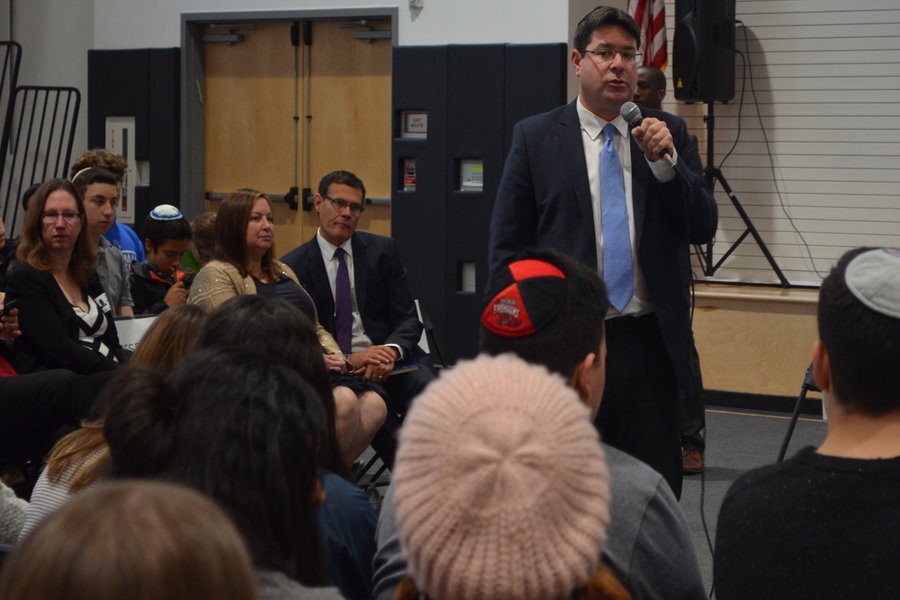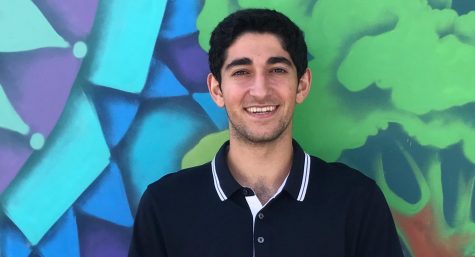Israeli Cabinet Minister tells assembly of joint stem cell research with California
BUSY: Israeli Minister of Science, Technology and Space, Ofir Akunis, spoke to an all-school assembly Feb. 8, as Consul General David Siegel looked on. Minister Akunis was in the U.S. to work on research and space agreements.
April 13, 2016
Feb. 8 was a busy day for Israel’s Minister of Science and Technology, Mr. Ofir Akunis.
In the afternoon, he signed an agreement on stem cell research between Israel and a California bio-tech firm. After that, he was heading to Washington, D.C., to meet with NASA in hopes of sending an Israeli astronaut to Mars.
But before that, he had a date to speak with the student body at Shalhevet.
“This agreement will deepen the partnership between Israel and California,” said Minister Akunis, whose full title is Minister of Science, Technology and Space.
He signed the deal later in the day at Cedars-Sinai Medical Center.
“[It will bring] together our most talented scientists to push the boundaries of stem cell research,” Minister Akunis said at the signing ceremony, according to the website of Israel’s Los Angeles Consulate, “and advance medical breakthroughs in the treatment of diseases ranging from cancer and diabetes, to Alzheimer’s and HIV-AIDS.”
Also on hand at Shalhevet that day was Israeli Consul General David Siegel.
“This agreement about science and technology will put Israel right there with California,” the Consul General said.
When the pair left the assembly, they went to Cedars-Sinai Medical Center to sign the agreement, which details the start of joint stem cell research by Israeli scientists and the California Institute for Regenerative Medicine, or CIRM.
It follows up on a 2014 Memorandum of Understanding signed by Gov. Jerry Brown and Israeli Prime Minister Benyamin Netanyahu, which encourages collaboration and innovation between their governments. CIRM is a $4 billion agency of the state of California.
It the first joint California-Israel project involving medical research. Israel already has trade and water development with California, however.
“We are facing discoveries in the next five to 10 years that will revolutionize medicine in the world,” Consul General David Siegel told a 9 a.m. schoolwide assembly in the gym. “It is all about science and technology, and stem cell is going to be a major issue, because there is a solution in our own bodies to cancer, HIV, and more.”
Stem cells are considered promising in medical research because they have a unique capability of becoming other cells in the body. But scientists still need to figure how to gather enough to make a transplant, and practical ways to direct the stem cells to where they are needed.
Consul General Siegel said the agreements had political implications as well – specifically, as a contrast to the goals of the anti-Israel BDS movement.
“When you think about BDS for a minute, the best answer is when you have the seventh-largest economy in the world, in California, signing so many agreements with Israel,” Consul General Siegel said, “about water, stem cells, cybersecurity, and more.”
After meeting at Cedars to sign the bio tech agreement, Minister Akunis planned to travel to NASA headquarters in Washington D.C. to speak to the space agency’s chairman. He said he would be trying to negotiate an agreement with NASA to bring an Israeli astronaut on the U.S mission to Mars.
Minister Akunis, who belongs to Netanyahu’s Likud party, also spoke about the troubles Israel was going through with its enemies in the Middle East.
“The enemies will always be wrong and Israel will always be right,” Minister Akunis said.
Minister Akunis asked the student body to oppose BDS.
Consul General Siegel said the agreements had political implications as well – specifically, as a contrast to the goals of the anti-Israel BDS movement.
“When you think about BDS for a minute, the best answer is when you have the seventh-largest economy in the world, in California, signing so many agreements with Israel,” Consul General Siegel said, “about water, stem cells, cybersecurity, and more.”














